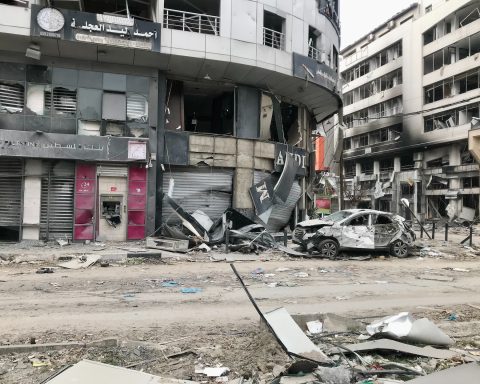
Rebecca Farrington (right) is a GP with a specialist interest in Asylum seeker mental health, and clinical lecturer at the University of Manchester.
In August 2021, evacuated families from Afghanistan arrived at short notice in UK hotels.
WhatsApp groups under the banner “Clinicians for Refugees” were rapidly set up to manage the outpouring of offers of help from UK clinicians. Contrast this to 76% of vulnerable patients excluded from registering with GP practices due to lack of documentation.1 The issues faced by asylum seekers and refugees (ASR) are unfortunately not new; however, the situation in Afghanistan brings them to the forefront of people’s attention.
Primary care is best suited to providing holistic and appropriate care, but it cannot be done in a 10-minute consultation, nor with short-term interventionist strategies relying on volunteers and goodwill. Using the example of Afghanistan, we highlight long term best practice.
Access
Two assistance programmes are offered for Afghan refugees to the UK – the Afghan Relocations and Assistance Policy (ARAP) scheme, or Afghan citizens’ resettlement scheme (ACRS). They may arrive as asylum seekers, and not have the same welfare support.2 Regardless of immigration status or nationality, everyone in the UK is entitled to free primary care. Lack of documentation is never considered reasonable grounds to refuse registration. “Safe Surgeries” commit to these values.1
Give people choice, they have lost control of much of their lives.
PHE has published guidance on some of the common health challenges to be mindful of in Afghan evacuees.2 Life expectancy is about 51 years for men and 54 years for women.3 Best practice includes offering initial health checks, TB screening, catch up immunisations,2 mental health screen, contraception and treating nutritional needs.
Communication
The main languages spoken in Afghanistan are Pashto and Dari.3 Language preferences and communication support needs should be recorded in the medical record. Double appointments should be standard, and independent professional interpretation used rather than relatives or children. Consider the dialect and gender of the interpreter and speak to the patient in the first person.
Listening
Remain curious, listen and build trust before asking about more sensitive issues such as torture. Approximately a quarter of vulnerable migrants who access primary care use somatization to express distress.4 Formal independent medico-legal reports must be commissioned by a solicitor and evidence of torture documented under the Istanbul Protocol by trained clinicians.
Cultural curiosity
Virtually all the people of Afghanistan are Muslims,3 so consider individual preferences over medication containing prohibited constituents, fasting over Ramadan and the gender of the clinician.5 Cultural responsiveness increases engagement of minority populations with healthcare. Women may struggle to access healthcare, so engage in opportunistic questioning.
Many Afghans face “post-migration stressors” including limited English proficiency, social isolation, poor accommodation, being moved, and worrying about family back home.
The NHS is confusing. It helps to explain how to access care in simple terms, and in their own language. Complete HC1 forms for HC2 certificates to access free prescriptions. Please do not charge destitute patients for letters and reports. Give people choice, they have lost control of much of their lives. Autonomy is key, but shared decision-making may not be something they recognise from medical staff in their country of origin, so explain it.
Managing distress
Afghanistan has had intermittent war since 1978.3 As well as pre-migration trauma, many Afghans face “post-migration stressors” including limited English proficiency (LEP), social isolation, poor accommodation, being moved, and worrying about family back home. Asylum seekers are unable to work so can feel they lack meaning and purpose, and only receive £39.63 a week. New refugees have advantage in terms of welfare rights, but acculturation can be hard. Asylum claims impact health much more than health impacts asylum claims.
Mental distress is a normal response to bad situations, so medication has limitations. Most recover well if basic needs are met. Simple anxiety management techniques, explaining the effects of trauma and psychological first aid can help.6
Diagnosis can help if function is poor, and to open up care pathways. Voluntary / Community Organisations provide purposeful activities – find out what is available to you locally. Nearly half the population of Afghanistan is under 15 years of age,3 and these children need to engage in normal play and education.
Conclusion
The recent news around Afghanistan is a welcome chance to reflect on how we provide primary care for those have had a rough journey. Time, care, perseverance and advocacy are the pillars of NHS, so this is the time to embed these into the provision of care for ASRs.
Key Messages:
1) Short-term interventionist strategies relying on volunteers and goodwill is insufficient to provide holistic and appropriate care to refugees and asylum seekers (ASR) in the UK.
2) Best practice for these groups in primary care includes supporting meaningful access to the NHS, recognising health challenges, communication, listening with respectful curiosity, advocacy and managing distress.
3) The recent news around care for ASR sparked by the Afghanistan crisis provides a chance for clinicians to reflect on how they care for those who have had a rough journey in the long term.
References
- Doctors of the World. Safe Surgeries provide hope of Vulnerable members of our communities excluded from 76% of UK GP practices. 9 August 2021. Available at: https://www.doctorsoftheworld.org.uk/news/safe-surgeries-provide-hope-for-vulnerable-members-of-our-communities-excluded-from-76-of-uk-gp-practices/ (Accessed, 16.10.2021)
- Public Health England. Afghan relocation and resettlement schemes: advice for primary care (publishing.service.gov.uk) September 2021
- Britannica. Afghanistan. 14 September 2021. Available at: https://www.britannica.com/place/Afghanistan (Accessed 16.10.2021)
- Aragona M, Rovetta E, Pucci D, Spoto J, Villa AM. Somatization in a primary care service for immigrants, Ethn Health 2012;17(5):477-91
- Nursing Times. Cultural competence in nursing Muslim patients. 30 March 2015. Available at: https://www.nursingtimes.net/roles/nurse-educators/cultural-competence-in-nursing-muslim-patients-30-03-2015/ (Accessed 16.10.2021)
- World Health Organization. Psychological First Aid for all. 2016 Available at: https://www.who.int/mental_health/world-mental-health-day/ppt.pdf (Accessed 16.10.2021)
Featured image by Katie Moum at Unsplash










Nada Khan is an Exeter-based NIHR Academic Clinical Fellow in general practice and GPST4/registrar, and an Associate Editor at the BJGP. She is on Twitter: @nadafkhan
The war in Ukraine has sparked the fastest growing refugee crisis since the second World War.1 Although the total numbers of refugees currently in the UK are low, this is expected to increase as the conflict continues and more Ukrainians arrive under the Home for Ukraine sponsorship programme. And as numbers increase, GPs might expect to start seeing Ukrainian refugees in their own surgeries.2 What does this mean for us in practice?
Ukrainian refugees will be able to access NHS services free of charge, and NHS England has recently issued guidance to GPs on providing healthcare to Ukrainian refugees.3 The guidance mainly focuses on screening and referrals for infectious disease, mental health conditions and reproductive health. Ukraine has the fourth highest incidence rate of TB in Europe, and one of the lowest rates of Covid immunisation in Europe with only 35% fully vaccinated up to February 2022.4,5 Accordingly, NHS guidance suggests screening every Ukrainian refugee for TB, and checking immunisation status for childhood disease and Covid vaccination status.
Aside from these initial, practical checks, however, this population of refugees have experienced real and recent trauma that needs careful early and long-term management. The terrifying images from this brutal war are a lived experience for those fleeing conflict, mental health must be a priority for refugees. However, while experts insist that any response needs to be trauma informed, the NHS is struggling with a lack of specialist support in an already strained mental health service.6 I worry about the long term health of this population, and our lack of preparedness and capacity to provide appropriate care over time to deal with these traumatic events. I have struggled for years to access such services for patients under my care, some of whom were asylum seekers with harrowing personal histories. I am not sure yet how to rapidly provide additional access to trauma-based psychological therapy for Ukrainian refugees. I would welcome any informed advice from readers in the comments to this article.
Alongside mental health considerations, it is worth thinking beyond just the initial checks for infectious disease. If continuity of care is like a thread linking patients, their health and their healthcare providers, this thread has been severed most unjustly for refugees. It is imperative to try and do what we do best as GPs to identify and manage long-term conditions such as diabetes, depression and hypertension. This is no easy fix, and will take time, care and repeated consultations to pick up on these lost threads of continuity.
It is no bad thing to be reminded that while recent policy focuses on Ukraine, in practice these principles apply to all refugees and asylum seekers. The UN Refugee Agency estimates that there were 135,912 refugees in the UK as of mid-2021, the majority of which were from Iran, Eritrea, Albania, Iraq and Syria,7 though I would expect increasing numbers from Afghanistan given the recent regime change and UK resettlement schemes. Last year, Clark and Farrington summarised guidance on care for Afghan refugees for BJGP Life, and their piece is worth a re-read for anyone looking after this population.8 So while our focus today might be on Ukraine, at least for me, this is a time to reflect on the specific health needs of asylum seekers and refugees coming to the UK. And probably, to consider the severe long-term mental health risks associated with the trauma of being pulled away from a home, a community, a country, a life.
References
Siegfried K. The Refugee Brief – 11 March 2022 2022 [Available from: https://www.unhcr.org/refugeebrief/the-refugee-brief-11-march-2022.
Department for Levelling Up HaC. ‘Homes for Ukraine’ scheme launches 2022 [Available from: https://www.gov.uk/government/news/homes-for-ukraine-scheme-launches.
Disparities OfHIa. Ukraine: migrant health guide 2022 [Available from: (https://www.gov.uk/guidance/ukraine-migrant-health-guide.
Data OWi. Coronovirus (COVID-19) Vaccinations 2022 [Available from: ttps://ourworldindata.org/covid-vaccinations?country=OWID_WRL.
Holt E. Growing concern over Ukrainian refugee crisis. The Lancet. 2022;399(10331):1213-4.
Davis N. Prioritise mental health support for Ukrainians arriving in UK, experts say. The Guardian. 2022.
Agency TUR. Asylum in the UK 2021 [Available from: https://www.unhcr.org/uk/asylum-in-the-uk.html#:~:text=How%20many%20refugees%20are%20there,are%20hosted%20by%20developing%20countries.
Clark EF, R. Migrants in vulnerable circumstances: not a quick fix: BJGP Life; 2021 [Available from: https://bjgplife.com/migrants-in-vulnerable-circumstances-not-a-quick-fix/.
Featured image by Daria Volkova on Unsplash